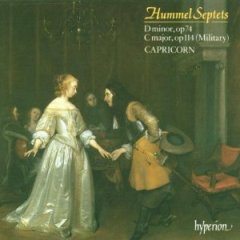Hummel - Septets (Capricorn) [1991]
Hummel - Septets (Capricorn) [1991]

Septet for piano, flute, oboe, horn, viola, cello & double bass in D minor 1. Allegro con spirit 2. Menuetto o Scherzo- Allegro 3. Andante con variazioni 4. Finale- Vivace Septett Militaire for piano, flute, violin, clarinet, cello, trumpet & double bass 5. Allegro con brio 6. Adagio 7. Menuetto – Allegro 8. Finale – Vivace Capricorn (Ensemble)
Johann Nepomuk Hummel (1778-1837) was born in what is now Bratislava, but in the late 18th century was called Pressburg, and part of the Austrian Habsburg Empire. A precocious child he soon displayed great skill on both piano and violin. His studies in Vienna with Mozart (he was taken on by Mozart as a student when he was just 6 years old), Salieri and Albrechstberger gave him the best musical education possible. It also saw him strike up a long (often turbulent, due to rows over women) friendship with Ludwig van Beethoven. These two young men were for many years the greatest virtuoso pianists in Vienna. Beethoven thought highly of Hummel, and during Hummel's lifetime his reputation was as a composer to rival Beethoven. Whereas that now seems totally unreasonable, Hummel's fall in to relative obscurity after his death (he was superseded by Chopin and Liszt) is also unreasonable and unjustified. His musical style provides a direct link with Mozart through to Chopin, who openly admitted his debt to the older composer. His music is wonderfully crafted, often dramatic, and for the pianist often very demanding.
The two works on this new CD showcase Hummel at his best. The large scale D minor septet (1816) is a first-rate composition. The piano has an extremely taxing part, but everything is beautifully written for the other instruments. It can stand alongside Beethoven's op20 septet as one of the most popular chamber works of the 19th century, and for many years after his death was one of only a few of his works that remained in the repertoire.
The C major septet (1829) features the trumpet, hence the title 'Military'. The influence of Beethoven can be detected in the stormy opening movement. The lovely dreamy slow movement, where the trumpet falls silent is a good example of Hummel's romantic style where Mozart and Chopin meet. --- brilliantclassics.com








